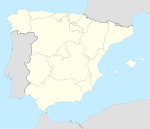Nolay (Soria)
| Nolay parish | ||
|---|---|---|
 Nolay - View of the town with the Church of San Clemente
|
||
| coat of arms | Map of Spain | |
 Help on coat of arms |
|
|
| Basic data | ||
| Autonomous Community : |
|
|
| Province : | Soria | |
| Comarca : | Comarca de Almazán | |
| Coordinates | 41 ° 32 ′ N , 2 ° 21 ′ W | |
| Height : | 1075 msnm | |
| Area : | 21.94 km² | |
| Residents : | 57 (Jan. 1, 2019) | |
| Population density : | 2.6 inhabitants / km² | |
| Postal code : | 42224 | |
| Municipality number ( INE ): | 42131 | |
| administration | ||
| Website : | Nolay | |
Nolay is a village and a municipality ( municipio ) with only 57 inhabitants (as of January 1, 2019) in the northern Spanish province of Soria in the autonomous community of Castile and León .
location
The place Nolay is a good 52 km (driving distance) southeast of the provincial capital Soria or approx. 20 km east of the small town Almazán at an altitude of approx. 1075 m above sea level. d. The climate in winter is cool, but in summer it is quite warm; the rather low precipitation (approx. 535 mm / year) falls - with the exception of the rather poor summer months - distributed over the whole year.
Population development
| year | 1900 | 1950 | 2000 | 2016 |
| Residents | 252 | 246 | 95 | 56 |
The significant population decline in the 20th century is mainly due to the mechanization of agriculture and the associated loss of jobs.
economy
In antiquity and in the early Middle Ages, the high-altitude and therefore almost always green area was visited by shepherds with their goats and sheep in the summer months . In the Middle Ages, small traders, craftsmen and service providers of all kinds also settled in the predominantly agricultural and largely self-sufficient rural community. Since the 1970s, tourism has developed into an important source of income in the form of the rental of holiday homes (casas rurales) .
history
No news is known from ancient or early medieval times. In 1098 the area was under Alfonso VI. of León (ruled 1065–1109) for the Christians ( reconquista ), but it was Alfonso I of Aragón who in 1128 - as part of territorial claims to parts of Castile - the impetus for repopulation ( repoblación ) and fortification of the place gave. Until the peace treaty concluded in Almazán in 1375 between Peter IV of Aragon and Henry II of Castile , the place remained controversial between the two kingdoms.
Attractions
- The most important building of the place is the mostly Romanesque Iglesia de San Clemente , whose bell tower was added in the 16th century. The exact from hewn stones built apse and for rubble built nave are rather kept unadorned; the arched portal protected by a porch ( portico ) shows two set columns on which the outer archivolt rests.
- The wash house ( lavadero ) on the outskirts was built in the 19th century.
literature
- Alberto Gallego Jiménez: Historia de un Lugar Castellano en la Tierra de Almazán: Nolay . Soria 2011.
Web links
- Nolay, various - photos + information (Spanish)
Individual evidence
- ↑ Cifras oficiales de población resultantes de la revisión del Padrón municipal a 1 de enero . Population statistics from the Instituto Nacional de Estadística (population update).
- ↑ Nolay - Map with altitude information
- ↑ Nolay - climate tables
- ^ Nolay - population development
- ↑ Nolay Church

